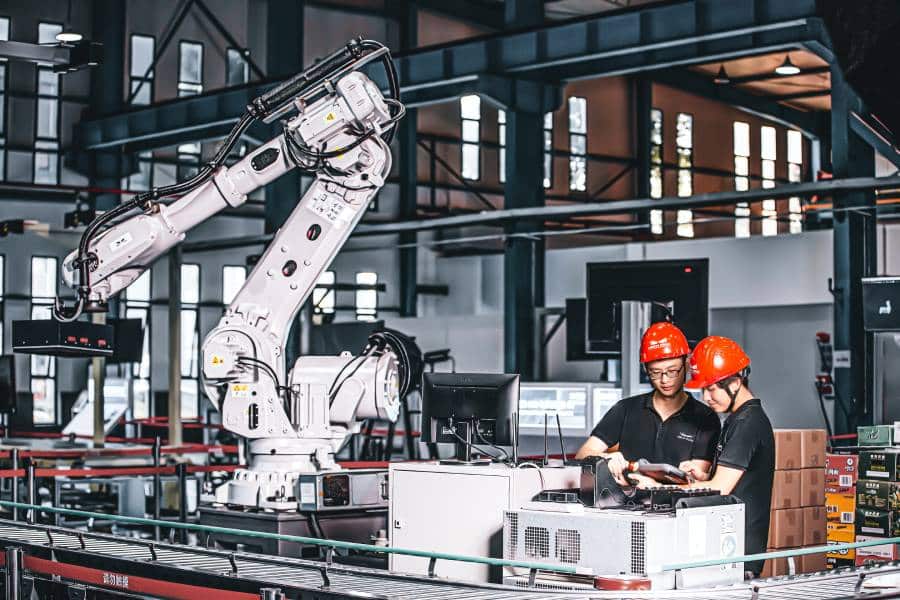
The Importance of Cybersecurity for Manufacturing Companies
With the dramatic increase of technology usage and implementation in manufacturing firms comes a high importance for cybersecurity. All too often businesses underestimate the power that cyber threats can have on their infrastructure and operations, leaving them exposed to considerable risk of data breach or other harmful attacks against their resources. It is essential for manufacturing firms to take into account potential security vulnerabilities and create programs geared towards reducing these risks.
Taking action now is key when moving forward with safeguarding vital company assets from malicious individuals both online and offline — stay ahead of the curve by learning more about what you can do today to promote your firm’s safety tomorrow!
More Competitive Edge
As a manufacturing firm, it is essential for business owners and operators to understand the rising prevalence of cyber threats and how serious these threats can be. In recent years, there has been an exponential increase in technology within this sector, leading to greater security risks as well as opportunities if properly safeguarded against. Cybersecurity measures need to be implemented in order to offer complete protection from malicious actors. Every firm should consider its particular internal processes, systems utilized, and external factors before putting together a plan that implements countermeasures against cyber-attacks such as malware and viruses that could disrupt operations or lead to data breaches.
It is also important for manufacturers that they stay abreast of the latest developments with regard to cybersecurity legislation. Currently many nations have laws on the books which prevent businesses from selling consumer data without knowledge or consent – though given their size may not necessarily have penalties associated with them at present time – having up-to-date policies related to these topics would go far towards providing evidence of good trustworthiness practices by any company’s clients.
Remaining cognizant of emerging trends helps firms anticipate new ways criminals might attempt infiltrating their structures or otherwise manipulating vulnerable areas; doing so requires considerable monitoring effort but can overall result in savings further down the road when dealing with attacks previously avoided due greater foresight put into place beforehand. Ultimately implementing robust protocol as regards privacy and cybersecurity does not only protect companies’ resources but also stands them in better stead competitively.
More Profit Generation
Cybersecurity is top priority for any manufacturing firm because the consequences of a potential cyber attack are potentially devastating. The first and most significant risk is the loss or theft of sensitive customer data, leading to irreparable damage to their reputation. It also poses an increased risk of breaches in financial systems like banks, which could lead to crippling losses that would take quite some time to recover from. In addition, there is both data and monetary risks incurred when third parties gain access to intellectual property or product specifications without authorization. Without adequate protective measures put in place this could lead not only to immediate losses but ultimately a decrease in overall profit generation as well.
A comprehensive and proactive cybersecurity policy should be established across all manufacturing firms. This will help reduce threats posed by external factors such as criminal organizations or hackers looking for risky targets with limited resources devoted towards protecting their networks effectively. Such efforts should include education on basic security practices including frequent updates on network software, creating complex passwords and implementing multi-factor authentication processes whenever possible as well as utilizing qualified personnel versed in cybersecurity principles.
Remaining Compliant
Cybersecurity should be a top priority for all businesses, especially those associated with manufacturing. As many operations become digitized and internet-connected, they are vulnerable to cyber threats such as data breaches, malicious attacks, and other potential security vulnerabilities. It is critically important that manufacturers take steps to remain compliant with industry regulations and up-to-date best practices when it comes to securing their networks from these dangers. Compliance measures vary between different types of manufacturing firms but generally focus on implementing secure systems for storing customer data as well as providing regular security updates for any software or hardware used in day-to-day operations.
As new technologies become available within the field of cybersecurity, so too do additional opportunities for staying ahead of the curve when it comes to remaining compliant in an ever changing landscape of risks faced by manufacturers today. Incorporating proactive strategies like maintaining effective network segmentation policies and using automated processes where possible can provide protection against malicious activity while helping maintain confidentiality protocol throughout the organization’s infrastructure.
Investing in training staff members on how to identify suspicious behavior or patterns online is essential in preventing a data breach before its even occurred. Allowing every level of personnel within a business (from executives down) access brings its own set of responsibilities; understanding these components can help ensure compliance across multiple functions undertaken within any given organization.
Protected Business Reputation
Protected Business Reputation (PBR) is an important factor for manufacturing firms. A good PBR helps companies attract new customers, retain current customers, and expand into different markets. Without a strong reputation, many potential business opportunities can be lost.
Cybersecurity threats have the potential to severely damage a company’s reputation by compromising the trust in their systems and data. For example, if a manufacturing firm were to suffer from a data breach or hacker attack, it could lead to numerous negative implications: legal action and fines; damaged customer trust; decreased confidence in supply chain management; compromised proprietary knowledge; increased security costs; reputational risk that could take years to repair – all of which threaten long-term corporate growth strategies.
The strengthening of cybersecurity measures should be among the highest priorities for businesses operating within the manufacturing arena–and generally at large–as they are often extremely vulnerable targets due to their heavy reliance on technology assets and digital infrastructure. Firms’ IT teams need sufficient resources led by experienced personnel who can create robust defense strategies that identify uncertainties as well as respond quickly when risks surface or happenings occur involving attacks on systems or networks.
Executives must also demonstrate dedication towards cyber resilience best practices including comprehensive staff training programs around prevention conversations such as phishing emails or vulnerabilities posed by external partners used specifically in design/manufacturing processes. Ensuring the continuity of operations is essential for any organization—especially one relying heavily upon IT services within its operations—which means not only responding effectively but also preparing contingencies ahead-of-time so disruption can be kept minimal despite whatever crises may materialize over time within their tech landscape.
Focusing on Core Competencies
Focusing on core competencies is essential for manufacturing firms in order to ensure that their operations are kept secure. By concentrating on the areas of their business where they have the highest level of proficiency, companies can bolster their cybersecurity by fortifying the defenses in place against malicious cyber attacks. In addition, having a solid grasp on core competencies allows for more effective decisions when it comes to building out an organization’s security infrastructure with technology and compliance measures.
Manufacturing firms should also maintain up-to-date policies and procedures around how data is handled and shared via digital systems. This way, personnel are aware of what information they should be protecting and how best to accomplish this task, as well as understanding any other potential exposures specific to each role within the company. Having comprehensive internal cybersecurity plans not only promotes a secure working environment but also helps suppliers stay compliant with external regulations, such as PCI DSS or GDPR compliance requirements established by various regulatory bodies like HIPAA or FDA’s International Cyber Security Standard (ICS2). With these protocols in place, organizations can confidently trust that all key stakeholders will adhere securely within their defined scope of work.
Proactive Maintenance
Proactive maintenance is an essential component of cybersecurity programs in manufacturing firms. This type of preventive measure seeks to address potential threats and vulnerabilities before they become problems or put the business at risk. Proactive maintenance ensures that employees have adequate security training, systems are up-to-date with software updates, networks are monitored for suspicious activity, and access points are well protected from unauthorized access. This can help detect issues early on and provide organizations with more time to respond as necessary. In addition to these measures, a well thought out continuity plan should be in place for when an attack does occur; this will minimize the impact felt by your organization.
Organizations must also stay aware of industry standards and best practices providing guidelines on how companies can protect themselves from malicious actors such as those responsible for data breaches, ransomware attacks, phishing scams, and other cyberattacks targeting manufacturers. Companies need to understand how their information is shared internally or externally between partners or customers in order to maintain optimal security across transactions made over digital platforms such as cloud applications connected through the Internet of Things (IoT). Ultimately implementing organized proactive maintenance procedures helps reduce risks associated with outdated technology infrastructure susceptible to outside interference leaving you better prepared against any kind of cyber threat imaginable now or in the future.
Increased Productivity
Increased productivity is an essential goal of any manufacturing business. As technology advances and the internet provides access to vast amounts of data, companies must strive to increase their efficiency in order to get ahead in the industry. Cybersecurity solutions are an important part of this effort as they help minimize risk and protect sensitive information from malicious attack or theft. By investing in these measures, a manufacturing firm can ensure their infrastructure is robust and secure against any external threats that could lead to downtime, loss of data, or financial loss.
At the same time, implementation of sophisticated cyber security systems should not act as a hindrance when it comes to increasing productivity; rather, these measures should be incorporated into operations without imposing too much cost or disruption on ongoing activities such as production timescales etc. For example, by investing in stronger authentication protocols such as Multi Factor Authentication (MFA), manufacturers can reduce human error while still maintaining adequate levels of protection against cyber-attacks.
Other techniques such as segmenting networks can also enable improved performance due to better allocation of resources along with enhanced protection for each system component that allows guaranteed operation at all times even if one element fails temporarily during peak stress periods like summertime power demand variances on grids based industrial facilities used by many large vendors across multiple verticals around the world everyday every hour 24/7/365 days out therein making them inherently more productive than competing ones who lack behind technologically add right tools sets capabilities under secured environment which makes them far more digital overtime for extended value real time databasing perceptive computations opposed otherwise non digital implementations elsewhere deployments over net!
Conclusion
As you can see, cybersecurity should be given top priority when it comes to the implementation of new technologies and their associated data. Cybersecurity threats have become more advanced in recent years, which has led to an increase in the severity of attacks against businesses.
Manufacturers must ensure that they are up-to-date on cyber protection so as not to suffer serious financial or reputational losses from a breach. Staying well informed on current trends and developments with cyber security will help firms remain proactive in their approach rather than reactive after suffering costly damage from an attack.
Taking these steps can help establish robust systems for mitigating potential risk factors thereby allowing manufacturers to optimize operations without having to sacrifice security for efficiency.




